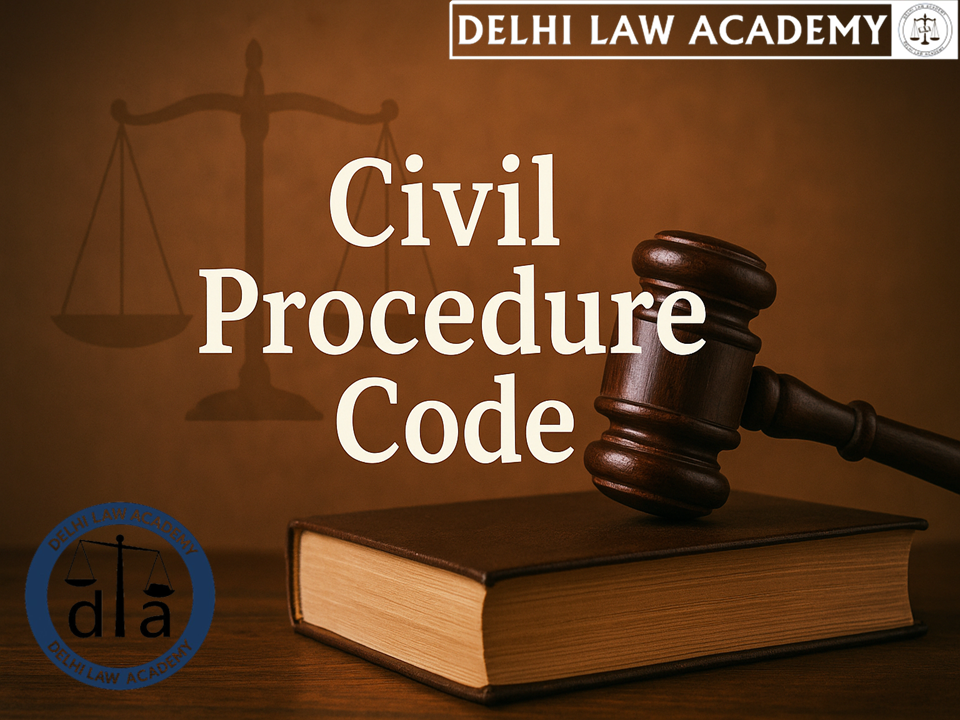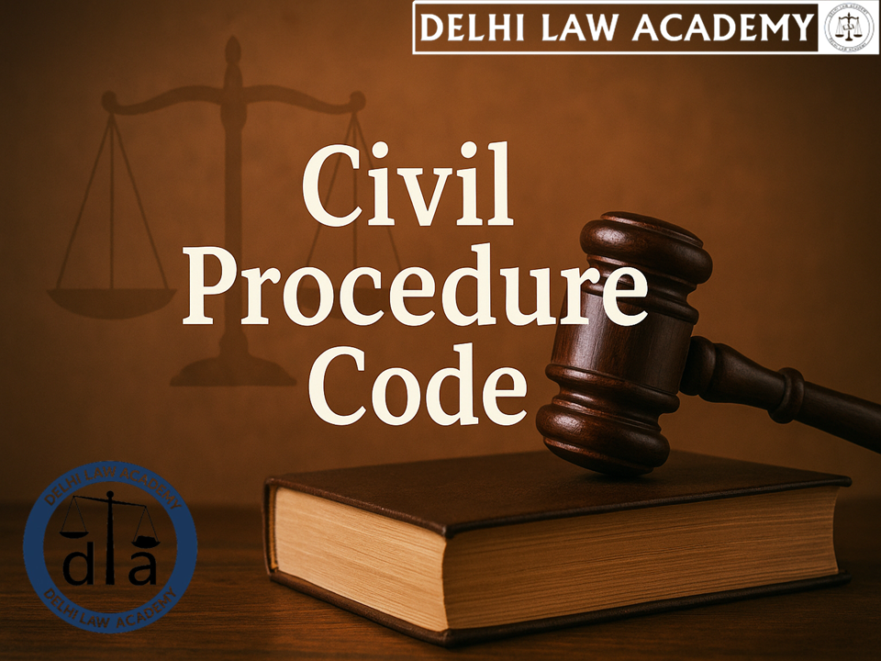
⚖️ Civil Procedure Code – Res Judicata: Sections 13 to 20
📑 Topics Covered
- When foreign judgment not conclusive
- Presumption as to foreign judgments
- Court in which suits to be instituted
- Institution of suits
- Property situate within jurisdiction of different Courts
- Where jurisdiction of Courts are uncertain
- Wrongs to persons or movables
- Institution of other suits
Preparation for Judicial Service Exams
The Civil Procedure Code forms the bedrock of any Judicial Service exam in India. Its thorough knowledge is essential for aspirants of RJS, DJS, PCS (J), and other Judicial Service exams. DELHI LAW ACADEMY JAIPUR provides comprehensive study material covering all crucial aspects of this vital syllabus.
🌐 When Foreign Judgment Not Conclusive – Section 13
- A foreign judgment shall be conclusive as to any matter thereby directly adjudicated between the same parties or parties under whom they claim, except:
- Not pronounced by a Court of competent jurisdiction
- Not given on merits of the case
- Founded on incorrect view of international law
- Opposed to natural justice
- Obtained by fraud
- Sustains a claim in breach of any law in force in India
📜 Presumption as to Foreign Judgments – Section 14
- Court shall presume, upon production of a certified copy, that the foreign judgment was pronounced by a Court of competent jurisdiction, unless contrary appears.
- This presumption may be displaced by proving want of jurisdiction.
🏛️ Place of Suing – Section 15 & 16
Court in which suits to be instituted – Section 15
Every suit shall be instituted in the Court of the lowest grade competent to try it.
Institution of suits – Section 16
- Suits for immovable property, partition, foreclosure, sale, redemption, or compensation must be instituted in the Court where the property is situated.
- Proviso: Relief obtainable entirely through defendant’s personal obedience may also be filed in Court of defendant’s residence or business.
🌍 Property Situate in Different Jurisdictions – Section 17 & 18
- Section 17: If property lies in multiple courts, suit may be filed in any Court within whose jurisdiction any part of the property exists, provided the entire claim is cognizable.
- Section 18: If jurisdiction is uncertain, any one of the Courts may record the uncertainty and proceed with the suit.
⚖️ Wrongs to Persons or Movables – Section 19
- If a wrong occurs within one Court’s jurisdiction and defendant resides/works in another, the plaintiff may sue in either Court.
- Illustrations:
- A residing in Delhi beats B in Calcutta – B may sue in Delhi or Calcutta.
- A in Delhi publishes defamatory statements in Calcutta – B may sue in either location.
📍 Institution of Other Suits – Section 20
- Every suit shall be instituted in a Court within whose jurisdiction the defendant resides, carries on business, or works for gain.
- Leave of Court is required if defendant is non-resident or objects.
- Illustrations:
- A (Calcutta) sells goods to B (Delhi) – suit may be filed in Calcutta (cause of action) or Delhi (B’s business).
- A (Simla), B (Calcutta), C (Delhi) joint promissory note – suit may be filed where note delivered (Benares) or where B/C reside.
📚 Continue Your CPC Preparation
Don’t stop here! Strengthen your knowledge of the Civil Procedure Code with our other fully solved tests:
📘 Free Study Material for Judiciary Aspirants!
Download our FREE study material prepared by Delhi Law Academy’s expert faculty.
❓ FAQs on Res Judicata: Sections 13–20 CPC
A foreign judgment is not conclusive if:
- It was not pronounced by a Court of competent jurisdiction
- It was not given on merits
- It violates international law or natural justice
- Obtained by fraud
- Sustains a claim breaching Indian law
Courts presume that a foreign judgment was pronounced by a competent Court upon production of a certified copy, unless evidence proves otherwise. The presumption can be displaced by showing lack of jurisdiction.
Suits should be filed in the Court of the lowest grade competent to try it. For immovable property or related reliefs, the suit must be filed in the Court where the property is located. If relief can be obtained by defendant’s personal compliance, it may also be filed in the defendant’s residence or business Court.
If immovable property is situated within multiple Courts’ jurisdictions, a suit can be filed in any Court covering part of the property, provided the claim is fully cognizable there. If jurisdiction is uncertain, any one Court can record the uncertainty and proceed with the suit.
If the wrong occurs in one Court’s jurisdiction and defendant resides or works in another, the plaintiff can sue in either Court. Illustrations:
- Assault in Calcutta by a Delhi resident – suit in Delhi or Calcutta
- Defamatory publication in Calcutta by Delhi resident – suit in either Court
Every suit should be filed in a Court where the defendant resides, carries on business, or works for gain. If non-resident, leave of Court is required or the defendant must acquiesce. Illustrations:
- Trade dispute: A (Calcutta) sues B (Delhi) – suit may be filed in Calcutta (cause of action) or Delhi (B’s business)
- Joint promissory note: Suit may be filed where note was delivered or where any defendants reside, subject to objections
Contact us
📍 Delhi Law Academy – Jaipur Branch
6C, Tower 2, Coaching Hub, Pratap Nagar, Jaipur – 302033
📞 Phone:
+91 9911916552
+91 8447285606
✉️ Email:
contactus@delhilawacademy.com

